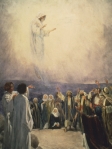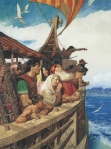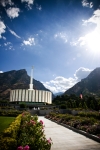When I was a missionary in northeastern Brazil, I occasionally received assignments to move to a different city. On those transfer days, one of the first priorities was to find out which bus would take me to the new area I had been assigned to. I don’t really miss the days of navigating crowded bus stops with two massive suitcases. But, in the heaving and bustling and waiting, it was always a relief to step onto the right bus and settle in for the ride. At that point, even though the passing landscape was unfamiliar, I knew that I was going to the right place, that, regardless of where that bus went along the way, I would end up where I was supposed to be.
In the early part of the Book of Mormon, the prophet Lehi has a vision: he sees a tree (representative of the love of God as manifest in the Savior) at the end of a path. Along the path, he sees a rod of iron (representative of the word of God) which leads to the tree, and he sees “numberless concourses of people” (1 Nephi 8:21) walking towards the tree. As they do, there arises “a mist of darkness; yea, even an exceedingly great mist of darkness, insomuch that they who had commenced in the path [do] lose their way” (1 Nephi 8:23); however, others on the path catch hold of the rod of iron and “press forward through the mist of darkness, clinging to the rod of iron” until they arrive at the tree and eat the fruit (1 Nephi 8:24). While mists of darkness obscure the view of the blessings at the end of the path, those who hold to the rod, to the word of God, eventually succeed in pushing through the darkness to their destination and ultimate rest.
In Brazil, I didn’t need to know the whole route to a new area in order to get to the right place: I only needed to know which bus to get on. In a similar way, Lehi’s vision is a reminder that we don’t need to know the whole route through our lives in order to move forward: we only need to know which path to get on.
A former teacher of mine explained that everything in our lives that really matters—career, marriage, self-esteem, peace, etc.—lies along the path of obedience. God would not set up our lives so that we would have to break His commandments in order to end up where we want to be. If we really want to enjoy the happiness He has in store for us, obedience is the way to get there. Whether or not we really know everything we will face along the way, we have the assurance that, if we hold to the word of God, we will end up enjoying the fruits of His love for each one of us. Just as every bus displays where it’s headed, the path of obedience, marked by the rod of iron, clearly leads to our deepest hopes. The trick for us is to stay the course when those mists of darkness arise, obscuring the destination from view for a season.
After he reports his father’s vision, Nephi explains that the Lord has given him a commandment to make two sets of historical records. While Nephi complies with the command, he confesses, “[T]he Lord hath commanded me to make these plates for a wise purpose in him, which purpose I know not” (1 Nephi 9:5). Perhaps as I sometimes felt, knowing I was on the right bus but also not recognizing any of my immediate surroundings, Nephi knew that obeying the Lord’s commands would get him where he wanted to be—even if he didn’t understand the ultimate purpose for each specific commandment. For Nephi, it wasn’t necessary to know exactly where each step would take him along the way: he only needed to know that the Lord would never direct him astray, for, as he wrote, “[T]he Lord knoweth all things from the beginning; wherefore, he prepareth a way to accomplish all his works among the children of men; for behold, he hath all power unto the fulfilling of all his words” (1 Nephi 9:6).
 I can only imagine how Peter must have felt in the minutes and hours following Jesus’ Ascension. At the conclusion of years of tutelage in the Master’s presence and with angels asking him now what he was doing looking up into heaven, the future of the Church must have yawned before the chief apostle. I imagine everything must have felt very quiet. With the benefit of a couple thousand years of hindsight, we can see the victory that came to that disciple as he carried on in the face of those feelings. But to him, it all must have seemed daunting. Where even to begin?
I can only imagine how Peter must have felt in the minutes and hours following Jesus’ Ascension. At the conclusion of years of tutelage in the Master’s presence and with angels asking him now what he was doing looking up into heaven, the future of the Church must have yawned before the chief apostle. I imagine everything must have felt very quiet. With the benefit of a couple thousand years of hindsight, we can see the victory that came to that disciple as he carried on in the face of those feelings. But to him, it all must have seemed daunting. Where even to begin? “Trust in the Lord with all thine heart,” we read in Proverbs; “and lean not unto thine own understanding. In all thy ways acknowledge him, and he shall direct thy paths” (Proverbs 3:5 – 6). Thus, embedded in the injunction to trust the Lord is the promise that, as we do so, He will lead us where we need to go. This sort of divine path-directing is evident throughout the scriptures: as the children of Israel fled Egypt, “the Lord went before them by day in a pillar of a cloud, to lead them the way; and by night in a pillar of fire, to give them light” (Exodus 13:21); while Peter was praying on a housetop, he saw a vision prefiguring the preaching to the Gentiles, and then “the Spirit said unto him, Behold, three men seek thee. Arise therefore, and get thee down, and go with them” (Acts 10:19 – 20); after the Lord commanded the prophet Lehi to gather his family and journey to a promised land, He also gave the prophet a sort of compass that “pointed the way whither [they] should go in the wilderness” (1 Nephi 16:10).
“Trust in the Lord with all thine heart,” we read in Proverbs; “and lean not unto thine own understanding. In all thy ways acknowledge him, and he shall direct thy paths” (Proverbs 3:5 – 6). Thus, embedded in the injunction to trust the Lord is the promise that, as we do so, He will lead us where we need to go. This sort of divine path-directing is evident throughout the scriptures: as the children of Israel fled Egypt, “the Lord went before them by day in a pillar of a cloud, to lead them the way; and by night in a pillar of fire, to give them light” (Exodus 13:21); while Peter was praying on a housetop, he saw a vision prefiguring the preaching to the Gentiles, and then “the Spirit said unto him, Behold, three men seek thee. Arise therefore, and get thee down, and go with them” (Acts 10:19 – 20); after the Lord commanded the prophet Lehi to gather his family and journey to a promised land, He also gave the prophet a sort of compass that “pointed the way whither [they] should go in the wilderness” (1 Nephi 16:10).